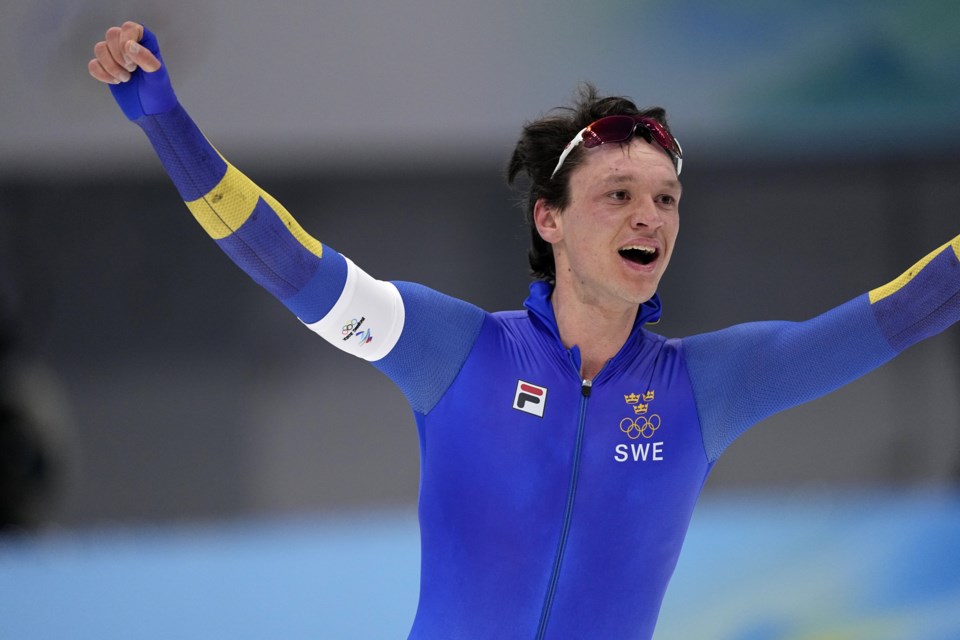BEIJING (AP) — Nils van der Poel has run 20-something ultra-marathons. He's gone skydiving hundreds of times. He's biked from one end of Sweden to the other. He's served a year in the army, completing his ranger training.
So when he needed a big kick on the final three laps of the Olympic 5,000-meter speedskating race, it was really no big deal.
Van der Poel gave Sweden its first Olympic speedskating medal since 1988, pulling off a stunning comeback to win gold Sunday at the Beijing Games.
He was a big favorite coming into the event as the reigning world champion, with an undefeated record in the distance events on this season's World Cup circuit.
Then, he lived up to the hype — though not without a few doubts.
“I was not so sure I was going to be the victor today,” van der Poel conceded. “Perhaps the expectations drop as you feel like the goal is slipping. But there's still fight, and you’ve got to struggle through it. That’s a challenge.”
Challenge met.
The 25-year-old of the 12 1/2-lap race to overcome Patrick Roest of the Netherlands with an Olympic record of 6 minutes, 8.84 seconds.
Roest had skated about an hour earlier in the sixth of 10 pairs, initially breaking the Olympic mark in 6.09.31.
Then he nervously watched in the workout room as one pair after another failed to take down his time.
It looked as though van der Poel in the final group would come up short, too, as he fell 2 seconds behind Roest's pace with three laps to go.
Then the Swede kicked it into another gear.
He thrilled the sparse crowd by slicing into Roest's time with each stride, his progression marked in real time on the scoreboard.
Turns out, van der Poel had just enough time to claim the gold. His final lap was a scorching 28.97 — his second fastest of the grueling event.
“A perfect race,” said Sweden's national coach, Joel Eriksson.
Van der Poel threw up his arms when he saw the “1” beside his name. Roest, watching the race on a video screen, let out a groan and dropped his head in disbelief, his coaches gathering around to console him.
The bronze went to Hallgeir Engebraaten of Norway in 6:09.88.
“The hard thing while speedskating is the first 80% of the race. That's all about setting yourself up for the last laps,” van der Poel explained. "When the last laps come, that's when it (stinks) the most, but you also know it's the last laps. You just go for it. You give it your all.”
Van der Poel became the first Swedish speedskater to claim a medal since Tomas Gustafson won a pair of golds in the 5,000 and 10,000 at the Calgary Games 34 years ago.
Since then, the Swedes had not finished higher than seventh in an Olympic race.
Roest knew it would be hard to hold off van der Poel.
Still, it was a bitter pill to swallow when he saw a potential gold medal slipping away.
“When you're so close, it's just painful," Roest said. "Of course, it's nice to have an Olympic silver. But when you're that close to the gold, it's very hard.”
Van der Poel got a break on the draw, winding up in the final pair, where he knew what time he would need to win gold.
Having skated much earlier, Roest felt helpless as he watched the Swede going faster and faster.
“You cannot do anything about it anymore," Roest said. "It's not in your hands anymore. That's painful.”
for a fourth straight speedskating gold medal in the 5,000 ended quickly.
The 35-year-old Dutchman skated in the first pair of the day and finished in 6:17.04 — more than 7 seconds off his gold medal-winning time at the Pyeongchang Games and good enough for only ninth.
“I expected much better but I didn’t feel well today,” Kramer said. “I was really going for it.”
Kramer was the first male skater to win the same event at three consecutive Olympics, but he’s no longer the world’s dominant long-distance performer.
Kramer plans to retire after the Beijing Games, but he still has a couple of events to go. He’ll also compete in the mass start and team pursuit.
No matter what, Kramer is already assured of leaving the sport as the most decorated male speedskater in Olympic history, with nine medals over the last four Games, including four golds.
“I’m not really thinking about that right now,” Kramer said. “I’m looking forward to the team pursuit and the mass start. Today wasn’t good enough.”
Emery Lehman and Ethan Cepuran of the United States finished 16th (6:21.80) and 17th (6:25.97), respectively.
for teammate Casey Dawson, who has been stuck in the U.S. after testing positive for COVID-19 several weeks ago.
Dawson still hopes to be cleared in time to get to Beijing for next week's team pursuit.
Van der Poel is looking forward to resuming the eclectic mix of physical challenges that help him stay motivated at the speedskating oval.
“Whatever you can get inspired by, you need to find that,” he said. “What do you have to bribe yourself with to train more than the others?
"If you can find the answer to that, perhaps you can win the Olympics.”
___
More AP Olympics: https://apnews.com/hub/winter-olympics and https://twitter.com/AP_Sports
Paul Newberry, The Associated Press


